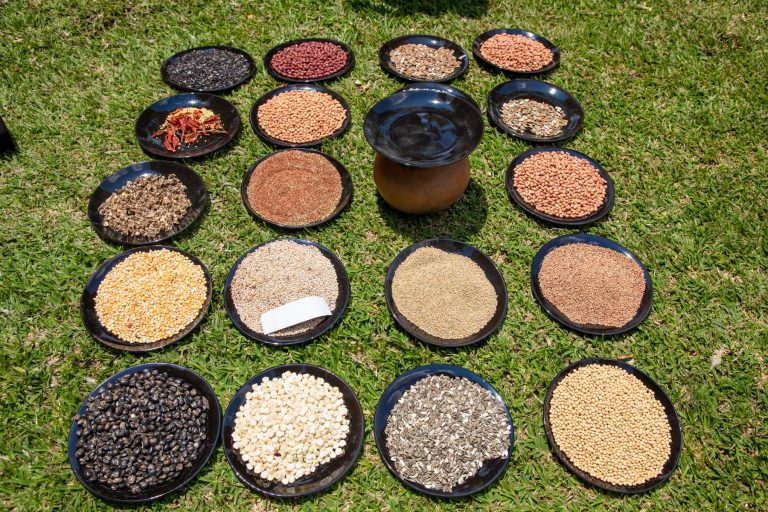After every successful farming season, women in rural Zimbabwe carefully glean through heaps of harvested crops looking for the finest products.
Seeds selected from the harvest are then stored away from direct sunlight in a shady area such as a granary or storeroom in a clay pot, bottle or bucket, where they are kept far from moisture and dirt.

This becomes seed for the ensuing planting season. A farming tradition that has maintained seed diversity for times immemorial amoung Zimbabwe’s smallholder farmers.
However, in seasons of poor rains and hence poor harvests, there is little or no seed to salvage for the next planting era, leading to the demise of many crop seeds.
Since seed is the key input in the food production value chain, it is important to maintain a sustainable seed bank for posterity.
Each family unit has the innate responsibility to select and store its seed varieties and this has kept the diverse Zimbabwean rural food systems running for years. In fact, these seed varieties fed into the genetic seed bank for national agro-biodiversity.
While family seed banks have been successful in keeping the seed over the years, it is even better if communities can come together and create a communal seed bank.
Working with farmers and community leaders in its family-to-family concept, Another International Level (AIL) created a platform where farmers share seed varieties, farming and preservation knowledge, to ensure that seed and crop diversity is maintained.
AIL appreciates the value of seed security and sovereignty.
As such, in rural communities such as Chikwaka, Domboshava, Mberengwa, Zvishavane, AIL’s family-to-family concept, created communal seed banks, where local farmers come together to not only showcase but exchange knowledge and seeds, promoting increased seed access and diversity.
Traditionally, families kept their own seeds for the ensuing farming seasons. AIL is promoting community seed sharing and storage. This allows for the preservation of seeds that were endangered in the face of international seed houses promoting few cash-crop seeds.
The rise of commercial seed-producing companies has led to the proliferation of the same mainstream seeds for staples such as potatoes, maize and wheat while relegating local crops such as cowpeas, rapoko, millets and sorghums.
Seed preservation is key to avoiding agro-biodiversity loss caused by either droughts, pests or other climate change-induced factors.
This compromises crop diversity, and dietary diversity scores leading to poor nutritional outcomes.
The contemporary diet of an average Zimbabwean is bread and tea in the morning, an afternoon snack usually of leftover bread from breakfast and diluted juice. In addition, a dinner of Zimbabwe’s signature dish of sadza, covo vegetable and a beef or chicken stew. This is a narrow diet; hence, the poor nutritional outcomes for most urban households, as reflected in the latest ZIMVC results.
Increasing the agricultural production of open-pollinated indigenous seed varieties, that are compatible with the savannah climate has many benefits.
Scientific proof shows that these varieties are not only climate-friendly but also nutritious.
Crop diversity by smallholder farmers and the maintenance of various seed varieties that have stood the taste of time are key in upping agricultural outputs in years of poor rains, promoting sustainable food systems and maintaining healthy diets.
Production of high-quality and high-yielding seeds, preserving diverse crop genetics and protecting them against loss encourage crop and dietary diversity.
Feeding Africa in particular and humanity in general in the face of the vagaries of climate change-induced natural disasters calls for the preservation of rich traditional food systems and the preservation of local seed varieties.
